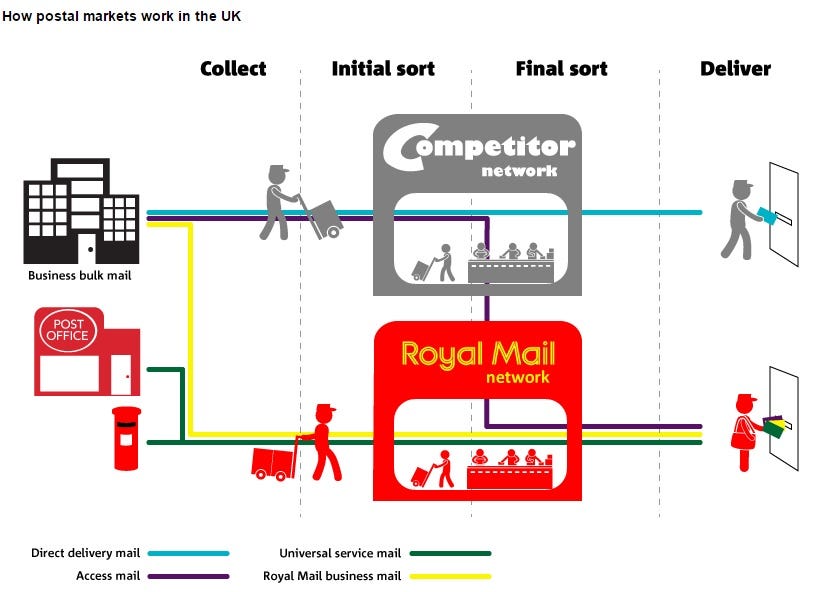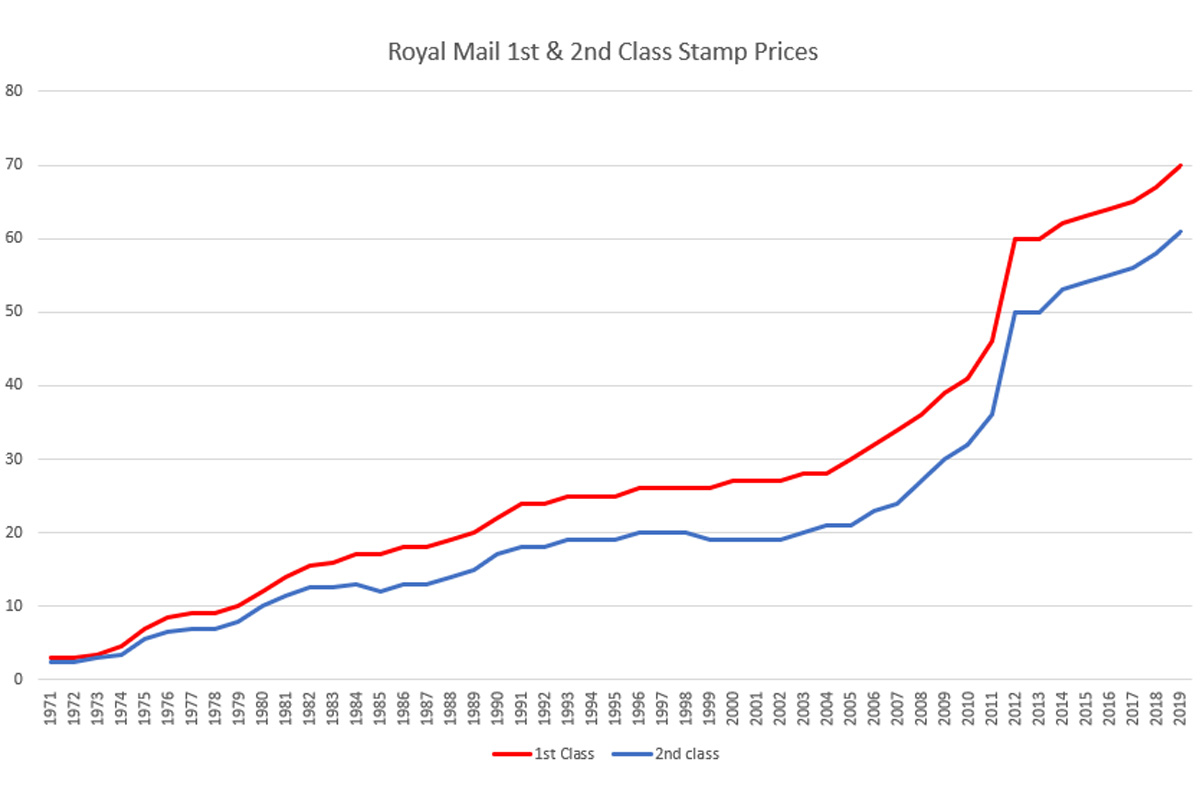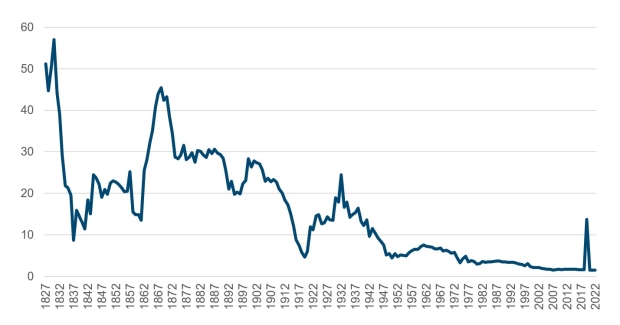Royal Mail Seeks Ofcom Regulatory Reform

Table of Contents
The Current Regulatory Landscape & Royal Mail's Challenges
Ofcom's Role and Current Regulations
Ofcom, the Office of Communications, is the independent regulator for the UK's communications industries, including the postal sector. Their role concerning Royal Mail involves setting and enforcing regulations designed to ensure a fair and competitive market while maintaining the Universal Service Obligation (USO). This includes price controls, service quality standards, and stipulations regarding the USO.
- Price Controls: Ofcom's price cap model limits Royal Mail's ability to increase prices for its services, impacting its revenue generation and investment capabilities. This is often governed by the Communications Act 2003 and subsequent amendments.
- Service Quality Standards: Regulations dictate minimum service standards for mail delivery, including delivery times and complaint handling procedures. Failure to meet these standards can result in penalties.
- Universal Service Obligation (USO): Royal Mail is obligated to provide a basic postal service across the UK at a uniform price, regardless of location. This places significant financial pressure on the company, especially in serving remote and less profitable areas.
Royal Mail's Financial Struggles and Operational Inefficiencies
Royal Mail faces significant financial challenges, largely due to declining letter volumes and increased competition in the parcels market. This has led to substantial losses and hindered investment in modernization and infrastructure improvements.
- Declining Letter Volumes: The shift to digital communication has caused a dramatic decline in letter volumes, impacting Royal Mail's core revenue stream. Estimates suggest a double-digit percentage decline in recent years.
- Increased Competition: The rise of private courier companies offering competitive parcel delivery services has intensified competition, putting pressure on Royal Mail's pricing and profitability.
- Operational Inefficiencies: Royal Mail has faced criticism regarding operational inefficiencies, leading to increased costs and impacting overall productivity. Streamlining operations and improving efficiency are key areas for improvement.
The Impact on Universal Service Obligation (USO)
The current regulatory framework, particularly the price cap model, makes upholding the USO increasingly difficult for Royal Mail. The financial strain of delivering affordable and reliable postal services to all parts of the UK, including remote and sparsely populated areas, is a major concern.
- Financial Viability: Maintaining the USO under current price restrictions is financially challenging, potentially jeopardizing service quality and accessibility in less profitable regions.
- Service Degradation: Without sufficient investment, Royal Mail may struggle to maintain current service standards across the entire UK, leading to potential service degradation in some areas.
- Potential Consequences of USO Failure: Failure to meet USO requirements could have severe consequences, including potential government intervention and further regulatory changes.
Royal Mail's Proposed Reforms & Their Implications
Specific Regulatory Changes Sought by Royal Mail
Royal Mail is advocating for several key regulatory changes to address its financial struggles and ensure the long-term viability of the postal service.
- Price Flexibility: Royal Mail seeks greater flexibility in setting prices to better reflect market conditions and operational costs, allowing for more competitive pricing in some sectors while maintaining affordability in others.
- Regulatory Burden Reduction: The company wants a reduction in certain regulatory burdens that it argues hinder efficiency and investment. This could include streamlining some operational requirements.
- Increased Investment: Royal Mail argues that increased financial freedom will allow it to invest in technological upgrades, infrastructure improvements, and new services to enhance efficiency and customer experience.
Potential Benefits of Regulatory Reform
The proposed reforms could bring several benefits, including increased investment and improved service quality.
- Modernization and Investment: Greater financial freedom would enable Royal Mail to invest in modernizing its sorting offices, expanding its parcel delivery network, and adopting new technologies to improve efficiency.
- Improved Efficiency: Reduced regulatory burdens could streamline operations, improving productivity and reducing costs.
- Enhanced Customer Service: Investments in technology and infrastructure would likely lead to improved delivery times, more reliable services, and a better overall customer experience.
Potential Drawbacks and Concerns
While reform offers potential benefits, there are also potential drawbacks and concerns.
- Higher Prices for Consumers: Greater price flexibility could result in higher postage costs for consumers, potentially disproportionately affecting low-income households and those in remote areas.
- Reduced Service Quality: Focusing on more profitable areas could lead to a reduction in service quality in less profitable regions.
- Anti-competitive Concerns: Relaxing regulations could potentially reduce competition within the postal market, potentially leading to a less diverse and innovative sector.
Conclusion
Royal Mail's financial challenges are significantly impacted by the current regulatory framework. The proposed reforms offer the potential for increased investment, improved efficiency, and enhanced service quality, but also raise concerns about higher prices and potential reductions in service quality for some customers. The ongoing debate surrounding Royal Mail's plea for Ofcom regulatory reform is crucial for the future of the UK postal service. Understanding the complexities of this issue is essential for consumers, businesses, and policymakers alike. Stay informed about the developments and engage in the discussion to ensure the UK's postal system remains efficient, affordable, and reliable. Further research into Royal Mail's Ofcom regulatory reform proposals will allow you to form your own informed opinion.

Featured Posts
-
 April 7th Royal Mail Stamp Price Increases A Complete Guide
May 19, 2025
April 7th Royal Mail Stamp Price Increases A Complete Guide
May 19, 2025 -
 Alex Pereiras Post Ufc 313 Loss Interview Future Plans Revealed
May 19, 2025
Alex Pereiras Post Ufc 313 Loss Interview Future Plans Revealed
May 19, 2025 -
 Analyzing Tariff Volatility A Global Perspective From Fp Video
May 19, 2025
Analyzing Tariff Volatility A Global Perspective From Fp Video
May 19, 2025 -
 Poitiers Rehabilitation De Batiments Judiciaires En 46 Appartements
May 19, 2025
Poitiers Rehabilitation De Batiments Judiciaires En 46 Appartements
May 19, 2025 -
 Chateau Diy Your Guide To Diy Chateau Renovations
May 19, 2025
Chateau Diy Your Guide To Diy Chateau Renovations
May 19, 2025
Latest Posts
-
 Agatha Christies Poirot A Critical Look At The Detectives Cases And Character
May 20, 2025
Agatha Christies Poirot A Critical Look At The Detectives Cases And Character
May 20, 2025 -
 Bbc Uses Ai For New Agatha Christie Writing Courses
May 20, 2025
Bbc Uses Ai For New Agatha Christie Writing Courses
May 20, 2025 -
 Aghatha Krysty Tewd Ila Alhyat Rwayt Jdydt Baldhkae Alastnaey
May 20, 2025
Aghatha Krysty Tewd Ila Alhyat Rwayt Jdydt Baldhkae Alastnaey
May 20, 2025 -
 The Enduring Appeal Of Agatha Christies Poirot An Analysis Of His Popularity
May 20, 2025
The Enduring Appeal Of Agatha Christies Poirot An Analysis Of His Popularity
May 20, 2025 -
 Bbc Launches Ai Powered Agatha Christie Writing Classes
May 20, 2025
Bbc Launches Ai Powered Agatha Christie Writing Classes
May 20, 2025
